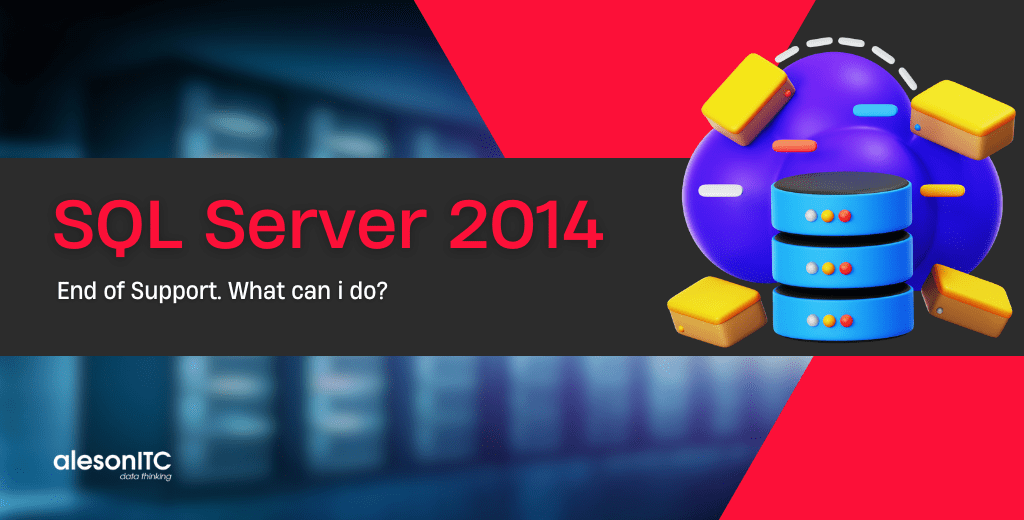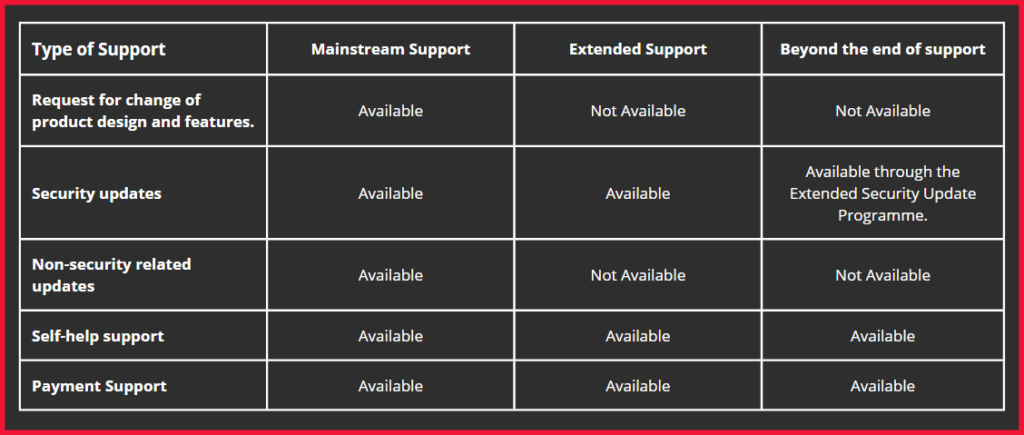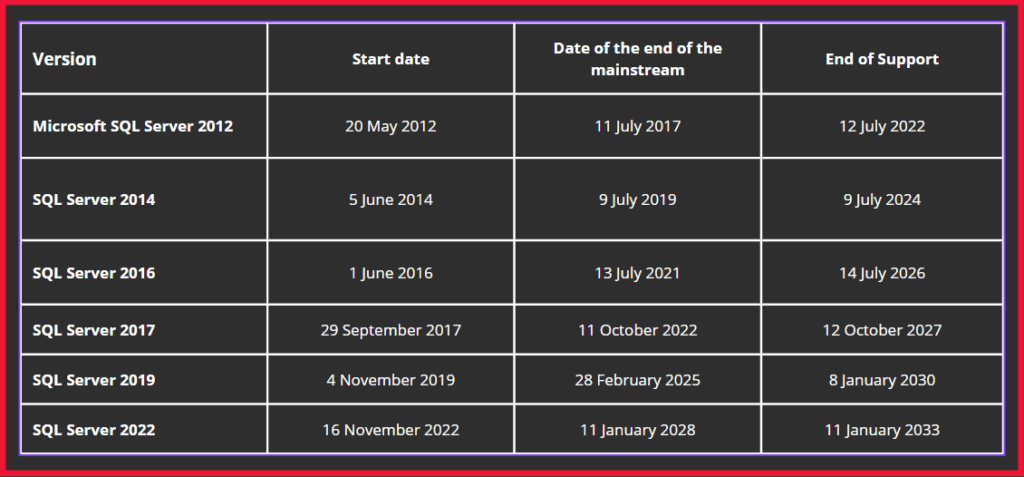SQL Server 2014 End of Support. What can I do?

Welcome to a new article on the Aleson ITC Blog. In today’s post we are going to talk about the end of the extended support that Microsoft gives to the 2014 version of SQL Server.
How does Microsoft’s fixed lifecycle policy and SQL Server support work?
Microsoft provides a minimum of five years of standard support and five years of additional extended support period for SQL Server.
Standard support is the first phase of the product lifecycle. At the Compatible Service Pack level, standard support for products and services includes incident support (free incident support, paid incident support, hourly chargeable support, warranty claims support), support for security updates, and the ability to request non-security related updates.
The extended support phase follows the standard support. At the supported service pack level, extended support includes paid technical support and security updates at no additional cost. The following table gives an overview.

Extended Security Upgrades (ESU)
Microsoft offers the ESU programme, which provides security updates for SQL Server for a period of three years after the end of extended support (a maximum of 13 years from general availability). These updates include critical and important security updates as defined by Microsoft.
Microsoft’s Extended Support Upgrades (ESU) for SQL Server are expensive, and the price varies depending on several factors:
- SQL Server version: Newer versions generally cost more to support.
- Licence edition: Enterprise editions tend to be more expensive than standard editions.
- Number of cores: The number of cores in the SQL Server instance affects the price.
- Duration of support: ESUs are generally purchased for one, two or three years, with prices increasing over longer terms.
Here is a general idea of the price structure:
- First year: Around 75% of the original license fee annually.
- Second year: Can be up to 100% of the original license fee annually.
- Third year: Can reach up to 125% of the original license fee annually.
Which versions are in standard or extended support and which versions are completely out of support?

SQL Server 2014 will be out of extended support on 9 July 2024. 2016 version has been out of mainstream support since July 2021 and is in extended support, so only security updates are provided. SQL Server 2017 has been out of mainstream support since October 2022 and is in extended support, so only security updates are provided.
What happens if I use an older version?
Using an older version of Microsoft SQL Server can lead to a variety of problems, mainly related to performance, security and technical limitations. For example:
Security vulnerabilities
Older versions may not receive security updates or patches, making them susceptible to vulnerabilities that are routinely addressed in newer versions. This increases the risk of unauthorised access and data breaches.
Compliance Issues
As security standards evolve, complying with industry regulations can become a challenge with outdated software. Non-compliance can result in significant fines and reputational damage.
Performance limitations
The use of older versions can result in slower performance and the inability to effectively handle increased data loads. Examples of performance issues include queries that take too long to process, month-end batch processing that takes too long to process, or employees being unable to access systems due to resource contention or excessive locking. Newer versions of SQL Server often include performance improvements and new features that improve efficiency and scalability.
Lack of Support
Once a release reaches the end of its support lifecycle, Microsoft no longer offers support. This can be problematic when faced with issues that need to be resolved, leading to increased downtime and potential business disruption.
Software compatibility
Modern applications may require the latest database features and integrations that older versions of SQL Server cannot provide, which can lead to compatibility issues.
Limited features
The newest version of SQL Server often come with advanced features, such as enhanced analytics, improved security measures and enhanced cloud integration capabilities that are not available in earlier versions.
Increased maintenance costs
Legacy systems can be costly to maintain. Organisations may have to spend more on customised solutions to protect and support obsolete software, including the ability to purchase extended security updates.
What are your strategic options?
Upgrading to a newer version
Upgrading to a supported version of SQL Server may be more cost-effective in the long run, especially if the current version is nearing the end of its standard support.
Migrate to Azure
Microsoft offers free extended security updates for SQL Servers running on Azure for three years. This may be a good option if you are comfortable migrating your database to the cloud.
Migrating to a non-Microsoft database
whether on premise or in the cloud.
How can we help you?
SQL Server Health Check
Aleson can help you by performing Health Checks on your SQL Server environments. A SQL Server health check is a thorough review and analysis of your SQL Server environment to ensure that it is configured for optimal performance, security, compliance and scalability. This process identifies any issues that may affect the stability, efficiency or security of the database server.
Migrations
Aleson can help you migrate from older versions of SQL to the latest version of on-premises SQL, help you migrate to Azure (SQL) or migrate a non-SQL database.
Servers Consolidation
Consolidation refers to the process of optimising and reducing the number of SQL Server instances and databases within an organisation into fewer, more manageable and more efficient systems. Typically, this strategy is applied to reduce hardware, licensing and operational costs, improve resource management and simplify the administrative burden associated with maintaining multiple servers and databases. At Aleson we are experts in complex server consolidations.
If you are looking to upgrade your SQL Server version don’t hesitate to contact us.

Marketing and Communication
Young marketing enthusiast. Committed to learning and growing in the field, seeking to understand the needs of the market and find opportunities to develop my skills to contribute to the success of marketing projects. Ready to learn from every experience.

